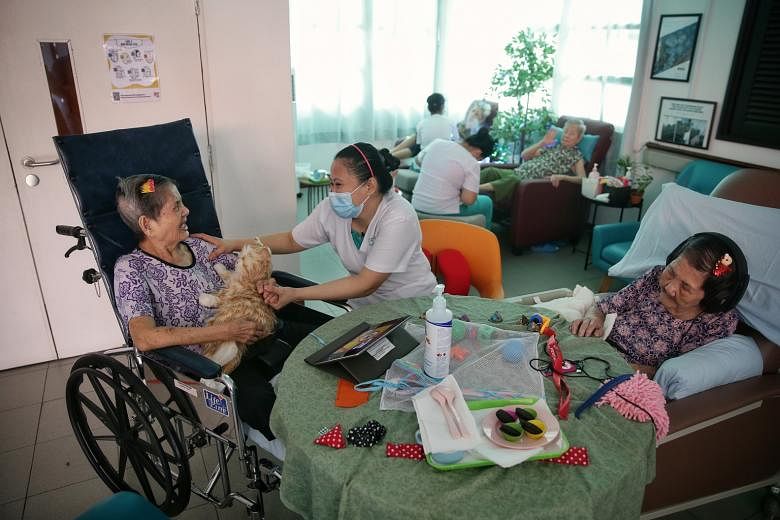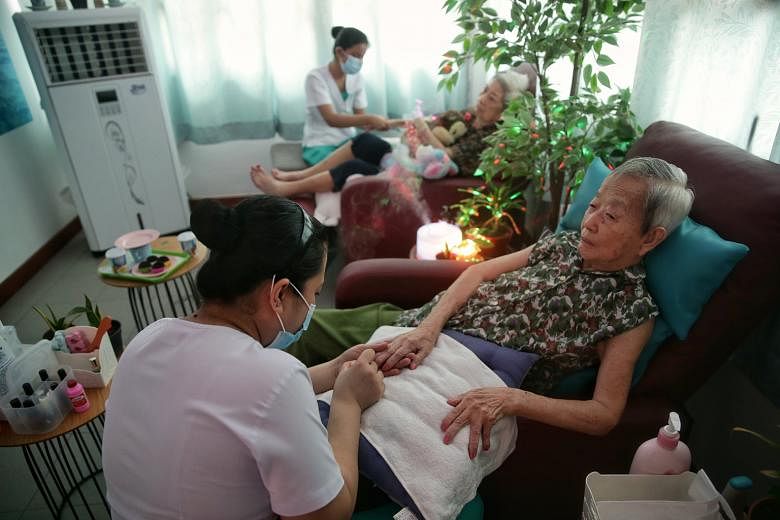Nursing homes and hospices are beefing up their digital and physical infrastructure to help ease the loneliness and frustration of seniors socially isolated amid the Covid-19 pandemic.
In Pasir Ris, Apex Harmony Lodge, which cares for dementia patients, has tested a new approach called Namaste Care, which involves giving residents gentle massages and manicures, and using aromatherapy oils and coloured lights to stimulate their different senses.
The pilot, which involved three residents in March, was successful, said Apex Harmony chief executive Soh Mee Choo.
Safe distancing measures mean visits from family members are less frequent, and patients with severe cognitive impairments are unable to connect virtually with family members and are thus less stimulated. This approach will help them to relax, said Ms Soh.
Apex Harmony staff nurse Karl Zamora said the programme has helped elderly residents sleep better, and reduced incidents of shouting and aggressive behaviour.
Madam Ang Sew Chu, 95, who has been a resident at the lodge for many years, goes for Namaste Care sessions about three times a week. Ms Zamora said she is now more alert, able to communicate through sounds and sleeps through the night.
The lodge plans to roll out the project to 60 residents, up from 30 now, as more staff have been trained in it, said Ms Soh.
The funding for the programme's expansion is provided by the Lien Foundation, which has helped other charities and organisations with financial support during the Covid-19 pandemic.
All in, it has committed $3.28 million in two tranches to 18 social service agencies and three hospitals under its Charitable Organisations Vital In Downturn (Covid) Fund.
Lien Foundation chief executive Lee Poh Wah said: "Many of the disruptions and difficulties that have surfaced amid the pandemic are severe and unanticipated for our sector and grantee partners."
The services provided by the Lien Foundation are a key part of Singapore's social safety net, said Mr Lee, adding that the foundation had anticipated pain on the horizon for many charities.
In April, it gave $1.2 million to 18 social service agencies with no conditions attached on how the money must be used. This was to give agencies the freedom and flexibility to quickly respond to the crisis.
The second tranche of funds, awarded this month, aims to help charity organisations seed new programmes and test-bed solutions to meet changing needs as they transform and adapt to a "new normal".
-
$3.28m
The total amount that Lien Foundation has committed to 18 social service agencies and three hospitals under its Charitable Organisations Vital In Downturn (Covid) Fund.
$1.2m
The amount that Lien Foundation gave to 18 social service agencies in April, to help them respond to the crisis.
Agencies have been given funds of up to $100,000 each, and most of them are using the money to adopt digital solutions, said Mr Lee.
Another organisation receiving funding from the Lien Foundation is HCA Hospice Care, which organised a "make-believe outing" for patients at its Serangoon day hospice in June.
Many of the senior citizens had never been on a plane before, so the hospice decided to create the experience for them - from checking in and boarding a plane to watching in-flight entertainment, disembarking and going through immigration.
Mr Antony Lee, who is HCA's assistant day hospice centre manager, said one patient told him he was overjoyed with the experience and had "no regrets".
The hospice plans to roll out a digital platform for its volunteers using the funding from Lien Foundation, so they can better engage with their patients through virtual befriending. The hospice's communications manager Jemin Chua said HCA also hopes to use the platform to bring the make-believe outings to the next level, such as having volunteers provide live translation for the patients, some of whom do not speak English - the language sessions are usually conducted in.
The Salvation Army Peacehaven Nursing Home is another Lien Foundation beneficiary that will use the funds to upgrade itself.
Last November, it launched for its residents a lifestyle club called the Jade Circle Arena on its premises, but due to the Covid-19 pandemic, residents have not been able to use it as regularly.
Peacehaven executive director Low Mui Lang said the home plans to have three smaller arenas by the end of November, featuring new machines with old-school games so that life still goes on for the residents and they can have fun.
Correction note: This article has been edited to reflect Ms Soh Mee Choo's correct name. We are sorry for the error.




